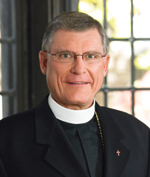by Jerry Kieschnick
 Have you heard some good sermons lately?
Have you heard some good sermons lately?
By a “good sermon,” I mean proper and powerful preaching of Law and Gospel — another of the hopes, dreams, and objectives that I have for the Synod in the years ahead. In my last two columns, I shared four of them, and I plan to add a sixth next month.
While most of our pastors do an excellent and faithful job of preaching, all too often I hear about poor preaching in stories and reports from laymen and women who visit LCMS congregations in their travels. Retired LCMS pastors and their wives who visit various congregations also have expressed such concerns.
Our church body “prides” itself on correct doctrine and practice, the ability to distinguish Law and Gospel, and thorough theological training for our pastors. Yet, somehow, there is too often a disconnect between the theoretical and the practical application of God’s Word to lives and hearts. Such concerns beg attention from seminary, district, and national Synod leaders.
Concerns I hear about preaching usually have to do with lack of clear articulation of both Law and Gospel and the absence of meaningful application of God’s Word to the human condition.
In some cases, pastors seem reluctant to address issues of sanctification. In other cases, attempts to provide practical assistance result in moralism, which clouds the clear communication of the Gospel and can lead either to self-righteousness or to despair over sin.
Our young confirmation students learn about Law and Gospel in the little blue catechism: “In the Law God commands good works of thought, word, and deed and condemns and punishes sin,” it says. “In the Gospel, the good news of our salvation in Jesus Christ, God gives forgiveness, faith, life, and the power to please Him with good works.”
Still, it is not easy to properly divide Law and Gospel. Dr. C.F.W. Walther, the Synod’s first president and an expert on the subject, said, “Rightly distinguishing the Law and the Gospel is the most difficult and the highest art of Christians in general and of theologians in particular. It is taught only by the Holy Spirit in the school of experience.”
Though it may be difficult to distinguish Law and Gospel, it is critical. This is readily apparent at this time of the church year.
At the end of the penitential season of Lent, with its proper reflection on the Law and our sinfulness, comes Holy Week. We hear again the institution of the Lord’s Supper and are reminded that in, with, and under bread and wine we receive the very body and blood of our Lord Jesus, given and shed for the forgiveness of our sins. Then, on Good Friday, we see in Tenebrae, the service of darkness, our Lord’s intense suffering.
Finally, on Easter, hallelujah! We see the empty tomb and Christ’s victory over Satan, death, and hell! We celebrate His resurrection—and are confidently reminded of ours! What an opportunity to focus on the assurance that “Christ has indeed been raised from the dead, the firstfruits of those who have fallen asleep. … For as in Adam all die, so in Christ all will be made alive” (1 Cor. 15:20, 22).
Because Jesus Christ rose bodily from the grave, our lives have meaning and are filled with hope. And we are empowered to share this wonderful Good News with others as Christ’s ambassadors (2 Cor. 5:20).
Preaching in the congregations of our Synod must focus on the central article of our faith, that we are justified before God by grace through faith in Jesus Christ, without any merit or worthiness in us. The power of the Gospel cannot be overestimated, and it must not be under-emphasized! A blessed Festival of the Resurrection to you all!




